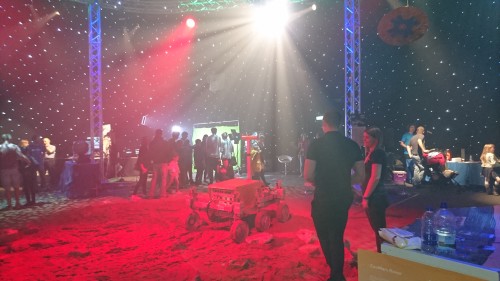Tag archives: Antarctica
Playing poker with robots on Mars

A prototype of the ExoMars rover trundles around inside the “space dome” at the Cheltenham Science Festival.
By Margaret Harris
How do you keep an astronaut alive, sane and (ideally) happy during a mission to Mars? The world’s space agencies would very much like to know the answer, but gathering data is tricky. The International Space Station (ISS) makes a good testbed for experiments on the physical effects of space travel, but psychologically speaking, ISS astronauts enjoy a huge advantage over their possible Mars-bound counterparts: if something goes badly wrong on the station, home is just a short Soyuz ride away. Martian astronauts, in contrast, will be on their own.
For this reason, space agencies have become interested in learning how people cope in extreme environments here on Earth, particularly in locations where rescue is not immediately possible. That’s why the European Space Agency (ESA) sent Beth Healey, a British medical doctor, to spend the winter of 2015 at Concordia Research Station, a remote base in the interior of Antarctica. During the continent’s nine-month-long winter, temperatures at Concordia can plunge as low as –80 °C, making it inaccessible even to aeroplanes, which cannot operate at temperatures below –50 °C. So once the last flight left in February 2015, Healey and the 12 other members of the overwintering team were stuck there until November.
View all posts by this author | View this author's profile
Adventures in Antarctica
By Matin Durrani
It’s the depths of winter in Antarctica right now, but in the new issue of Physics World magazine, there’s a chance to feast your eyes on some stunning images of scientific research in the White Continent, taken a few months ago by photojournalist Enrico Sacchetti.
Sacchetti’s photographs are amazing and in the article he explains his experiences of travelling to Antarctica and taking pictures in what is one of the world’s harshest environments.
“As soon as I stepped off the C-130 [plane], the alien nature of Antarctica was truly jolting…Almost completely absent of atmospheric pollution, the air was crystal clear,” Sacchetti writes.
View all posts by this author | View this author's profile